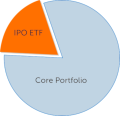VectoIQ Acquisition, a blank check company led by former GM execs and focused on the smart transportation industry, disclosed on Tuesday that virtually all shareholders voted to approve the pending acquisition of hydrogen-powered electric truck startup Nikola Corp. Currently listed on the Nasdaq under the symbol VTIQ, the company is expected to begin trading on the Nasdaq under its new ticker NKLA on Thursday, June 4.
To screen for SPACs and track the IPO calendar, sign up for a free trial of our premium platform, IPO Pro.
The shareholder approval was expected, with VTIQ trading between $20 and $30 for the past three weeks, or 100% to 200% higher than the $10 IPO price and redemption price. Investors may be betting that Nikola will become the next Tesla, whose shares closed Tuesday at about $882, a gain of 104% year-to-date and 5,088% from its 2010 IPO.
This isn't the first time that investors have bid up a large and highly ambitious yet commercially unproven SPAC merger: Richard Branson's Virgin Galactic (SPCE) went public in October following its acquisition with Social Capital Hedosophia, and closed Monday at $15.82 (+58% from IPO) after soaring as high as $37 in February. Another large SPAC success, sports betting platform DraftKings (DKNG), closed Tuesday at $41.27, a 313% return from its $10 blank check price. DraftKings is highly unprofitable, but should benefit from the long-term shift to legal online gambling in the US.
VectoIQ raised $200 million in a May 2018 IPO. In March 2020, the SPAC agreed to merge with Nikola Corp at an implied enterprise value of about $3.3 billion, having secured a $525 million private placement led by Fidelity. Nikola will retain its CEO, Trevor Milton, who founded the company in 2014. The SPAC's CEO, Steve Girsky, joins the board; Girsky is the former Vice Chairman of GM.
Nikola expects to generate revenue by 2021 with the roll-out of its BEV truck, followed by FCEV truck sales starting in 2023 and the initial build out of hydrogen fueling stations to serve Nikola customers' fleets, such as Anheuser-Busch. The company states that it has more than 14,000 pre-orders representing more than $10 billion in potential revenue over two and a half years of production.



